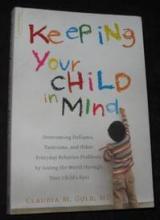BELLEVUE, WASH. – Dr. Claudia M. Gold spent 17 years in general and behavioral pediatrics being frustrated time and again by a familiar cycle: A parent would ask for help with a child’s problematic behavior, Dr. Gold’s "bag of behavioral tricks" wouldn’t help, the parent would begin to speak in increasingly negative terms about the child, and Dr. Gold would feel increasingly negative about the parent.
At a loss, she would recommend that the parent take the child to a therapist, the parent usually would not, and eventually the child would end up with a psychiatric diagnosis and on medication. Those years paralleled an explosion in diagnoses of pediatric bipolar disorder in the United States and the use of atypical antipsychotics in children with explosive behavior.
Then Dr. Gold took classes to learn more about infant mental health and attachment theory. She incorporated an emphasis on reflective relationships in her work, which "transformed my practice. Suddenly children were getting better. Amazing things were happening," said Dr. Gold, director of the Early Childhood Social Emotional Health Program at Newton-Wellesley Hospital, Newton, Mass.
The key to this change was implementing principles of reflective functioning, also known as "mentalization," which Dr. Gold calls "holding the child in mind." She and other speakers at a conference sponsored by the North Pacific Pediatric Society said that applying these principles to the pediatrician-parent relationship, and helping parents use them in the parent-child relationship, makes all the difference.
"Behavior problems" are problems of self-regulation of intense emotion, and self-regulation develops through coregulation in relationships with primary caregivers, Dr. Gold explained.
She starts by helping the parent reflect on the meaning of the child’s behavior, the child’s wants and needs, instead of just focusing on the behavior itself. "Even for a moment, reflect on the child’s experience. The child feels that, and calms down or begins to calm down. Parents begin to feel better," she said.
Dr. Gold outlined four essential components of reflective functioning in her book, "Keeping Your Child in Mind: Overcoming Defiance, Tantrums, and Other Everyday Behavior Problems by Seeing the World Through Your Child’s Eyes" (Boston: Da Capo Press, 2011):
1. Curiosity about the meaning of behavior. This means considering the thoughts and feelings driving a child’s behavior.
2. Empathy. This means reframing "difficult" behavior as "stressed" behavior.
3. Containing and regulating the child’s experience. This step can involve setting limits.
4. Self-regulation. This step involves the parent or pediatrician managing their own feelings.
When the pediatrician uses these same principles to reflect on the parent’s experience, that supports the parent’s efforts to reflect on the child’s experience, Paula D. Zeanah, Ph.D., said in a separate presentation.
Just as infants and young children in distress rely on the parental relationship, the pediatrician is "functioning as that go-to figure when the parent is in distress," said Dr. Zeanah, professor of clinical psychiatry at Tulane University and interim chief of pediatrics at Tulane Hospital for Children, both in New Orleans.
And just as a child’s behavior can trigger emotions and frustrations in the parent, the parent’s actions do the same for pediatricians. "We don’t spend enough time reflecting on how parents make us feel," she said.
Studies have shown that patients often provide clues to aspects of their inner lives that primary clinicians usually don’t recognize or acknowledge, missing opportunities for empathy and personal connection that are key to building the physician-patient relationship.
Dr. Zeanah recommended "really basic stuff that seems to make a difference," such as active listening, fewer interruptions, sitting so you’re face-to-face and making eye contact, and tailoring short-term and long-term goals according to the child’s and family’s needs.
Ask open-ended questions: "Is this what you expected?" of parenting. About social support: "Who helps you with the baby?" About mood: "Being a new parent can be exhausting. How are you doing?" About work: "How much time off do you have from work for the new baby?" About behavior: "What upsets you most about your baby?"
Notice parent-infant interactions and support parents by acknowledging the relationship. Especially during times of distress, say something supportive like, "Your baby turns to you when he’s upset."
Dr. Nancy Thordarson, codirector of the meeting, used to follow a typical pediatrician’s impulse to show parents how to calm a child and be a better parent. Things have really shifted for the better in her practice since she started pointing out the relationship to parents with comments like, "I notice he turns to you for comfort when he’s stressed. He looks to you for support. Your relationship is helping him grow his brain."


